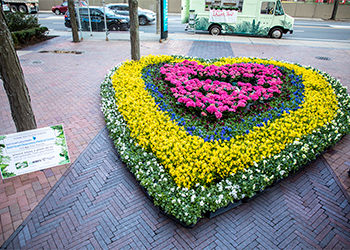
Two years ago, on March 10, 2020, Massachusetts Governor Charlie Baker declared a State of Emergency in response to the COVID-19 outbreak. That day, fewer than 10 people per day were testing positive for the virus in the Commonwealth. One month later, more than 2,000 people would test positive each day.
Since then, more than 1.6 million Massachusetts residents have contracted COVID-19, and nearly 24,000 have died. In addition to the illness and loss, healthcare providers have spent the last two years laboring through multiple surges. Students of all ages had to quickly adapt to untested remote or hybrid learning strategies, while some office workers attempted to juggle the demands of their careers and family lives – simultaneously. Add to this all the inability to gather with family members, friends and neighbors, and you have a population under unprecedented stress.
"Marking an anniversary allows us to reflect on what we have experienced in the past and helps to anchor us for moving into the future," said Barbara Sarnoff Lee, LICSW, senior director of Social Work and Patient/Family Engagement at Beth Israel Deaconess Medical Center (BIDMC). "It is important to give ourselves permission to pause, reflect and accept whatever feelings come forward. There is no 'right way' to feel since each of us experienced the pandemic through our own personal lens of experience."
Reflecting on two years of the COVID-19 pandemic and its impact on Massachusetts, we asked experts across BIDMC about managing another year of the unknown, how to shore up our mental resources to heal from what we've been through and how to prepare for whatever may lie ahead.
Many people are encountering grief due to the COVID-19 pandemic. Whether grief comes from changes in daily routines, the loss of a loved one, a job or another reason, BIDMC's Spiritual Care team reassures that each person's emotional response is valid. BIDMC's Nancy R. Smith, MAJS, LICSW, BCC, Jewish chaplain, Jessica D'Angio, MDiv, BCC, multifaith chaplain, and Rebekah Ingram, MDiv, BCC, multifaith chaplain, recommend taking time to think about what may be a comfort during this time, such as cultural or spiritual rituals, traditions or journaling.
"Anniversaries are significant and can stir up a wide range of emotions. Feeling and naming those emotions can be a helpful first step. There are a number of available tools and grounding exercises such as a body scan or breathing practice that only take a few minutes of time but could be a sustaining resource. We should be mindful of the many different kinds of losses we have each experienced. Some are permanent, some temporary, and many remain ambiguous. All of these losses are significant. It's important not to put a timeline to your grieving process as each person's grief and how they grieve is unique."
The pandemic has caused stress and anxiety for many individuals and communities. Learning to cope in healthy ways and practicing self-care can help ease some of these overwhelming feelings.
"Self-care is as individualized and fluid as our emotional reactions to events," said Melissa Doyle, LICSW, clinical social worker at BIDMC. "What worked early in the pandemic to help us cope may not be working as well now, and it may be helpful to pause and reflect on what is serving you well in this moment. There may be times when self-care isn't enough and getting extra support or working with a professional can be the next best step."
Doyle suggests trying to take the time to intentionally pause throughout the day, spending a few moments acknowledging positive experiences and connecting with those feelings. Having meaningful conversations about those feelings, as well as concerns, can help relieve stress as well. Safely connecting with family, friends and community circles is important for yourself as well as to support those around you.
"My colleagues and I rely on the three key components for offering support, as outlined in a paper by Shandfelt, Ripp and Trockel," said Pamela N. Peck, PsyD, Director of Clinical Health Services at BIDMC. "I see you. I hear you. I care for you. Whether that message comes from a person or an institution, help and support comes from being genuinely interested in people's experience. There's power in communicating those three things."
Visit the Centers for Disease Control and Prevention's How Right Now






